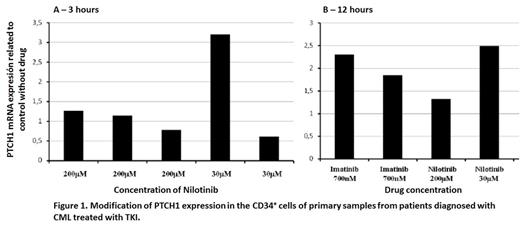Abstract
Introduction
Chronic myeloid leukaemia (CML) is a clonal disorder of the pluripotent hematopoietic stem cell compartment, characterized by a reciprocal translocation between chromosomes 9 and 22, giving rise to the BCR-ABL1 oncogene. Hedgehog (Hh) signaling pathway seems to be an important role in physiopathology of CML, with a constitutive activation in progenitor cells. Moreover, an increased expression of PTCH1, a negative regulator of Hh signaling pathway, is a prognostic marker in CML patients associated with a low probability of discontinuation of treatment, higher rates of major molecular response and a lower probability of progression or death related to CML. We sought to test the effect of different tyrosine kinase inhibitors (TKI) on PTCH1 expression and to characterize the downstream effectors related to apoptosis controlled by Hh pathway in CML.
Methods
CD34+ cells from bone marrow samples of CML patients had been seeded at 7 x 104 -1 x 106 cell/mL on RPMI 1640, 10% fetal bovine serum with 700nM imatinib, 30nM or 200µM nilotinib. After 3-12 hours, mRNA was extracted and qPCR were performed to analyzed PTCH1 mRNA expression. mRNA expression of PTCH1 of CD34+ and CD34- cell from 4 bone marrow samples of CML patient had been compared using qPCR. Differences in expression values had been analyzed using T-Student or Wilcoxon test for paired samples.
K562 cell line seeded at 2 x 105 cell/ml had been treated with ciclopamine 2.5 or 5 µM. 300µg of protein had been used to perform a Proteome Profiler Human Apoptosis Array Kit (R&D). Differences in expression of 34 protein related to apoptosis were analyzed using One-way ANOVA test.
Results
Nilotinib did not show significative effect in PTCH1 mRNA expression at 3 hours neither with 200 µM (figure 1a, P= 0.71, n=3) nor 30 µM (figure 1a, P= 0.65, n=2). When the incubation time with drugs had been increased (12 hours), the differences were not significatives neither with Nilotinib (figure1b, p = 0.18) nor Imatinib (figure1b, p = 0.18). PTCH1 mRNA expression did not show significative difference between CD34+ and CD34- cells (P= 0.157). However, ciclopamine, antagonist drug of SMO and thus, inhibitor of Hedgehog pathway like PTCH1, decreased the expression of BCL2 protein, an antiapoptotic protein, in K562 cell line at 2.5 µM (56.3 %, P = 0.026) and 5 µM (62.1 %, P = 0.038) in comparison with this cell line without treatment.
Conclusion
We have not found statistically significant differences in PTCH1 expression under different TKI treatments but maybe due to lack of statistical potency. No differences in PTCH1 expression between CD34+ and CD34- had been previously reported. Our sample is very reduced but support those results. As previously described in other malignancies, BCL2 is a downstream effector of Hh pathway also in CML.
No relevant conflicts of interest to declare.
Author notes
Asterisk with author names denotes non-ASH members.


This feature is available to Subscribers Only
Sign In or Create an Account Close Modal